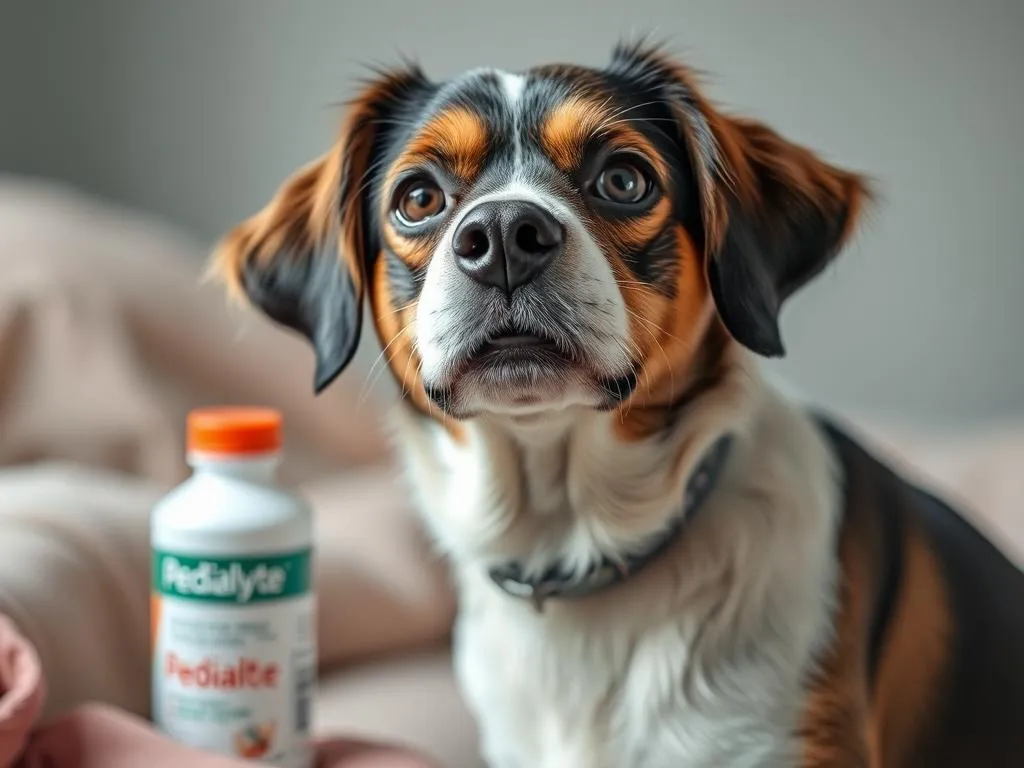
Introduction
Proper dog nutrition is crucial for maintaining your furry friend’s health, energy levels, and overall well-being. Just like humans, dogs require a balanced diet rich in essential nutrients to thrive. In some instances, such as during bouts of illness or dehydration, the need for additional support becomes even more pronounced. One product that often comes up in discussions about hydration is Pedialyte, an electrolyte solution designed primarily for humans. This article aims to explore is Pedialyte safe for dogs and under what circumstances it can be beneficial for your canine companion.
Understanding Dog Nutrition
Importance of Balanced Diet
A balanced diet is fundamental to your dog’s health. It should consist of macronutrients and micronutrients, tailored to meet their specific needs.
- Macronutrients:
- Proteins are essential for muscle development and repair. They act as the building blocks for your dog’s cells and tissues.
- Fats provide energy and support cell structure, while also aiding in the absorption of fat-soluble vitamins.
-
Carbohydrates serve as a quick energy source, although dogs can derive most of their energy from proteins and fats.
-
Micronutrients:
- Vitamins (A, D, E, K, and B-complex) and minerals (calcium, phosphorus, potassium, etc.) are vital for various bodily functions, including immune support, bone health, and metabolic processes.
Common Nutritional Deficiencies in Dogs
Despite best intentions, many dog owners may inadvertently overlook their pets’ nutritional needs, leading to deficiencies. Common signs of deficiencies include:
- Calcium deficiency: Weak bones, lethargy, and muscle spasms.
- Vitamin A deficiency: Poor coat condition, eye problems, and reproductive issues.
- Vitamin D deficiency: Weakness, bone pain, and dental issues.
Special Dietary Needs
Different life stages and conditions require tailored dietary considerations:
- Puppies: Higher protein and fat content to support growth and development.
- Adult dogs: A balanced diet to maintain weight and energy for daily activities.
- Senior dogs: Lower calories with higher fiber and joint-supporting nutrients.
Additionally, certain breeds may have unique dietary needs based on genetic predispositions to health conditions.
What is Pedialyte?
Composition of Pedialyte
Pedialyte is an oral electrolyte solution containing:
- Sodium and potassium: Essential for maintaining fluid balance.
- Chloride: Works alongside sodium to maintain hydration.
- Carbohydrates: Provide a quick source of energy.
Human Uses of Pedialyte
Pedialyte is commonly recommended for humans experiencing dehydration due to:
- Vomiting or diarrhea
- Excessive sweating
- Illnesses that increase fluid loss
The benefits of rehydration through Pedialyte include restoring fluid balance, replenishing electrolytes, and aiding in recovery.
Can Dogs Have Pedialyte?
Safety of Pedialyte for Dogs
When considering is Pedialyte safe for dogs, it’s essential to examine its ingredients. Generally, Pedialyte is considered safe for dogs in moderation. However, specific formulations may contain artificial flavors or sweeteners, such as xylitol, which is toxic to dogs. Always check the label before offering Pedialyte to your pet.
Potential Risks or Side Effects
While Pedialyte is often safe, potential risks may include:
- Upset stomach: Some dogs may experience gastrointestinal discomfort.
- Overconsumption: Excessive intake can lead to an imbalance in electrolytes.
- Underlying health issues: Dogs with specific health conditions may require special dietary considerations.
When to Use Pedialyte for Dogs
Pedialyte can be beneficial in certain situations:
- Vomiting and diarrhea: Helps replenish lost fluids and electrolytes.
- Heat exhaustion: Assists in restoring hydration after overheating.
Recommended Dosage Guidelines
The appropriate dosage of Pedialyte depends on your dog’s size and condition. A general guideline is:
- Small dogs (under 20 lbs): 1 to 2 tablespoons every hour.
- Medium dogs (20-50 lbs): 1/4 to 1/2 cup every hour.
- Large dogs (over 50 lbs): 1/2 to 1 cup every hour.
Always consult your veterinarian for tailored advice.
Alternative Solutions
If you’re hesitant to use Pedialyte, consider these alternatives:
- Rehydration solutions made for dogs: These are specially formulated to meet canine needs.
- Homemade electrolyte solutions: Mix water with a pinch of salt and sugar to create a dog-friendly alternative.
Signs of Dehydration in Dogs
Recognizing Dehydration
Dehydration can be serious and requires vigilance. Common symptoms include:
- Dry gums: A clear indicator of dehydration.
- Lethargy: Reduced energy and activity levels.
- Decreased appetite: A refusal to eat can signal underlying issues.
When to Seek Veterinary Help
If your dog shows signs of dehydration, it’s crucial to determine the severity. Consult your veterinarian if your dog exhibits:
- Persistent vomiting or diarrhea.
- Signs of severe lethargy.
- Excessive drooling or lack of urination.
Your vet may recommend treatments such as intravenous fluids or medications to address the underlying cause of dehydration.
Best Practices for Dog Hydration
Ensuring Proper Hydration
Keeping your dog well-hydrated is vital for their health. Here are some tips:
- Encourage drinking: Place multiple water bowls around the house to make access easier.
- Wet dog food: Incorporate wet food into their diet for added moisture.
- Fresh water availability: Change the water daily to keep it appealing.
Incorporating Electrolytes Safely
Electrolytes play a key role in hydration. To ensure your dog gets adequate electrolytes:
- Balanced diet: Feed high-quality dog food that contains balanced nutrients.
- Electrolyte supplements: If necessary, choose products specifically designed for dogs.
Conclusion
In summary, understanding is Pedialyte safe for dogs involves recognizing its potential benefits and risks. While Pedialyte can be a helpful tool in rehydrating your dog during specific circumstances, it’s essential to consult your veterinarian before introducing any new substances into your dog’s diet. Remember that maintaining a balanced diet and ensuring proper hydration is key to your dog’s long-term health.
By prioritizing your dog’s nutrition and hydration needs, you can help them lead a healthy, happy life. Always stay informed about their dietary requirements and seek professional advice when in doubt.









